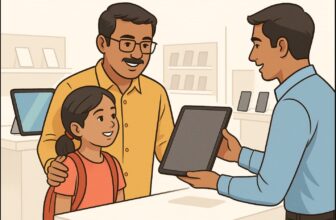In 2025, WhatsApp remains the most-used messaging app in India but it’s also one of the easiest ways for scammers to reach you. From fake job offers to dangerous links that steal your money or personal data, scam messages are becoming harder to detect and more convincing than ever.
Whether you’re a student, a working professional, or someone helping parents use their phones safely, knowing what to avoid can protect you from fraud, financial loss, and privacy breaches.
This listicle breaks down 15 common types of scam messages circulating on WhatsApp across India. You’ll learn what these messages look like, how they trick you, and most importantly how to stay safe.
1. Messages Promising Free Government Subsidies or Yojanas
Scammers exploit the popularity of government schemes by sending messages that appear to offer benefits from programs like PM Awas Yojana or Kisan Yojana. These messages often contain links to fake websites that closely resemble official government portals. Unsuspecting users may be prompted to enter personal information, which is then used for identity theft or financial fraud.
How to Identify:
- Messages from unknown numbers claiming to be government officials.
- Links that do not match official government URLs (e.g., using “.com” instead of “.gov.in”).
Preventive Measures:
- Always verify the authenticity of the message by visiting the official government website or contacting the relevant department directly.
- Avoid clicking on suspicious links or downloading attachments from unknown sources.
2. Messages Claiming You’ve Won a Lottery or Prize
These scams inform you of winning a lottery, prize, or gift from a contest you never entered. They often ask for personal details or a processing fee to claim the prize. Once you provide this information or pay the fee, the scammers disappear, leaving you at a loss.
How to Identify:
- Unsolicited messages about winnings from unknown contacts.
- Requests for personal information or payment to claim the prize.
Preventive Measures:
- Remember that legitimate lotteries or contests do not ask for fees to claim prizes.
- Do not share personal or financial information with unknown contacts.
3. Forwarded Bank Messages Asking You to Update KYC
Scammers impersonate banks, sending messages that urge you to update your Know Your Customer (KYC) details to avoid account suspension. These messages contain links to fake websites designed to steal your credentials.
How to Identify:
- Messages with a sense of urgency regarding account suspension.
- Links that do not lead to the official bank website.
Preventive Measures:
- Banks do not request KYC updates via WhatsApp. Always contact your bank directly using official channels to verify such requests.
- Avoid clicking on links or providing personal information through unsolicited messages.
4. Job Offers from Unknown Numbers with Unreal Pay
Scammers offer high-paying job opportunities requiring minimal effort, such as liking YouTube videos or data entry. They may ask for an upfront fee for training or materials and then disappear once the payment is made.
How to Identify:
- Unsolicited job offers promising high income for little work.
- Requests for upfront payments for training or materials.
Preventive Measures:
- Research the company offering the job. Legitimate companies do not ask for upfront payments.
- Be cautious of job offers that seem too good to be true.
5. Messages Asking for Immediate UPI or QR Code Payments
Scammers pose as acquaintances or sellers requesting urgent payments or claiming they accidentally sent money to your account. They may send QR codes that, when scanned, withdraw money from your account instead of depositing it.
How to Identify:
- Urgent payment requests from unknown contacts.
- QR codes sent with unclear explanations.
Preventive Measures:
- Verify the identity of the sender through a different communication channel before making any payments.
- Understand that scanning a QR code can both send and receive money; exercise caution.
6. Suspicious Messages Offering Part-Time Trading or Investment Tips
These messages offer investment opportunities with guaranteed high returns, often in stock trading or cryptocurrency. They may invite you to join exclusive groups where you are pressured into investing in fraudulent schemes.
How to Identify:
- Unsolicited investment offers promising high returns with low risk.
- Pressure tactics to make quick investment decisions.
Preventive Measures:
- Be skeptical of investment opportunities that promise guaranteed returns.
- Consult with a licensed financial advisor before making investment decisions.
7. Fake Loan Offers with No Documents Required
Scammers offer instant loans with minimal documentation and attractive interest rates. Once you express interest, they may ask for processing fees or access to your personal information, leading to financial loss or identity theft.
How to Identify:
- Loan offers with unrealistic terms and no credit checks.
- Requests for upfront fees or sensitive personal information.
Preventive Measures:
- Only consider loan offers from reputable financial institutions.
- Avoid sharing personal information or paying fees upfront for loan approvals.
8. WhatsApp Verification Scams (6-Digit Code Messages)
Scammers attempt to gain access to your WhatsApp account by tricking you into sharing the 6-digit verification code sent to your phone. Once they have access, they can impersonate you and scam your contacts.
How to Identify:
- Messages requesting your WhatsApp verification code, often claiming to be sent by mistake.
Preventive Measures:
- Never share your WhatsApp verification code with anyone.
- Enable two-step verification in WhatsApp settings for added security.
9. Messages Asking You to Vote or Support a Cause with a Link
Scammers use emotional or political bait to make you click on links disguised as petitions, fundraisers, or opinion polls. During elections or major events in India, these messages become more frequent. The links may lead to phishing websites that ask for personal data or silently install malware on your phone.
How to Identify:
- Emotional appeal: “Support this poor child,” “Help farmers’ cause,” or “Vote for change.”
- Link shorteners (bit.ly, tinyurl) hiding the real URL.
Preventive Measures:
- Never click links without verifying the sender or the source.
- Look up the cause on official NGO, government, or news websites before responding.
10. Urgent Messages Pretending to Be from Family or Friends
One of the most common scams in India now involves profile cloning. Scammers download a person’s profile photo and use a similar name to pretend they’re your family or friend. They say things like “My phone is lost, I need money urgently,” and request UPI transfers.
How to Identify:
- Slight spelling differences in the name.
- A message that says they’ve changed their number and immediately asks for help.
Preventive Measures:
- Always call the original number or video call the new number to verify identity.
- Warn your family members to never trust urgent messages without confirmation.
11. Messages Offering Free Netflix, Amazon Prime, or OTT Subscriptions
Scammers circulate messages claiming you can get 1-year free Netflix, Amazon Prime, Disney+ Hotstar, or other OTT access via a special “promotion.” The links either ask for your login credentials (to steal and resell), or ask you to install apps that extract your stored passwords.
How to Identify:
- “Congratulations! You’ve got 1 year free Netflix” followed by a suspicious link.
- These often use fake urgency, like “only for the first 500 users.”
Preventive Measures:
- Official OTT platforms never run such campaigns via WhatsApp.
- Always check on the brand’s official website or social media page for offers.
12. Fake Messages Offering Work Visa or Study Abroad Opportunities
You may receive WhatsApp messages from fake “agents” offering guaranteed Canadian, UK, or Gulf country jobs and student visas with “no IELTS, no experience required.” These are mostly fraudulent and ask for advance payments or document scans that may be misused.
How to Identify:
- Messages with bad grammar or too-good-to-be-true claims.
- Urging you to “act now” to not lose the opportunity.
Preventive Measures:
- Never share documents or make payments without verified immigration consultants registered with MHA/MEA.
- Use Ministry of External Affairs’ eMigrate portal to verify legitimate job or visa offers.
13. Malicious Google Forms or APK Files Sent on WhatsApp
Scammers may send you Google Forms that ask for your Aadhaar number, PAN card, or other sensitive information. Even worse, they may send APK files (Android app installers) pretending to be updates, coupons, or tools. Once installed, these apps can control your phone, read SMS, or activate your camera.
How to Identify:
- .apk files sent directly via chat or links disguised as apps.
- Google Forms that ask for sensitive data like passwords, banking info, or OTPs.
Preventive Measures:
- Never install any app sent over WhatsApp. Only download apps from the Google Play Store.
- Do not enter personal info in forms unless they are officially sent by known institutions.
14. Messages Saying “Your WhatsApp Will Stop Working Soon”
This common phishing scam warns you that your WhatsApp will “expire soon” or that “your number is under review.” It gives you a link to “renew” or “verify” your account, but it’s fake. The link leads to a fake WhatsApp login page to steal your number and hijack your account.
How to Identify:
- Scare tactics like “Your account will be suspended in 24 hours.”
- URL not belonging to whatsapp.com.
Preventive Measures:
- WhatsApp is free and does not expire.
- If in doubt, go to the official WhatsApp support page or settings in the app.
15. Clickbait News or Celebrity Death Messages
Scammers use fake headlines like “You won’t believe which Bollywood star died today” or “Shocking video of PM Modi!” These are designed to grab your attention and get you to click a link that leads to malware, adware, or spyware downloads.
How to Identify:
- Sensational tone, capital letters, or shocking photos.
- Click-through links that don’t go to established news websites.
Preventive Measures:
- Cross-check breaking news on trusted sources like NDTV, PIB Fact Check, The Hindu, or ANI.
- Avoid forwarding such messages to others, even if they look believable.
Quick Summary – 15 WhatsApp Scams Circulating in India
| Message Type | Common Bait | Real Risk | Action You Should Take |
|---|---|---|---|
| Free Yojana Offers | PM Awas Yojana, Subsidies | Identity theft | Only trust gov.in or verified apps |
| Lottery Wins | ₹25 Lakh, iPhone, Bike | Money loss, data theft | Ignore, never pay any fee |
| KYC Alerts | “Your account will be blocked” | Account hack | Visit bank website or call |
| Job Offers | ₹50K/week online job | Telegram scam, fee fraud | Verify company, never pay upfront |
| UPI Scam | “Wrong transfer”, QR code | UPI theft | Never scan QR unless verified |
| Trading Tips | Guaranteed profits | Investment fraud | Ignore, consult registered SEBI advisor |
| Instant Loans | No docs needed | Harassment, data theft | Only use RBI-registered lenders |
| WhatsApp Code | “Sent you OTP by mistake” | WhatsApp hijack | Never share code, enable 2FA |
| Fake Campaigns | Petition/vote request | Phishing | Check official sources |
| Family Impersonation | “Need money urgently” | UPI loss | Always confirm with call |
| OTT Offers | Free Netflix/Prime | Login theft, spyware | Check official offers only |
| Visa Scams | No IELTS required | Advance fee fraud | Use only verified agents |
| APK Files | Coupon app, update | Full phone access | Never install apps from WhatsApp |
| Fake WhatsApp Expiry | “Account will close soon” | Phishing login | Ignore, WhatsApp is free |
| Shocking News | Celebrity death, scandal | Malware | Cross-check news via trusted outlets |
Final Advice
- Never click on links from unknown senders.
- Avoid installing any APK files from WhatsApp forwards.
- Enable two-step verification in your WhatsApp settings.
- Report and block suspicious numbers immediately.
- Always verify sensitive info with a direct call not text.
Even a single click can cause financial or emotional damage. Stay alert, and help your friends and family in India stay protected in 2025.





